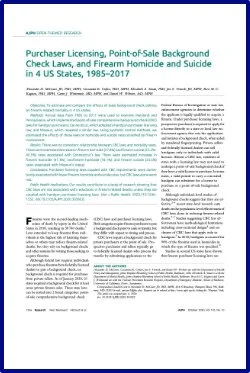By Alexander D. McCourt, Cassandra K. Crifasi, Elizabeth A. Stuart, Jon S. Vernick, Rose M. C.Kagawa, Garen J. Wintemute and Daniel W. Webster
Objectives. To estimate and compare the effects of state background check policies on firearm-related mortality in 4 US states. Methods. Annual data from 1985 to 2017 were used to examine Maryland and Pennsylvania, which implemented point-of-sale comprehensive background check (CBC)laws for handgun purchasers ; Connecticut. which adopted a handgun purchaser licensing law; and Missouri, which repealed a similar law. Using synthetic control methods, we estimated the effects of these laws on homicide and suicide rates stratified by firearm involvement. Results. There was no consistent relationship between CBC laws and mortality rates. There we re-estimated decreases in firearm homicide (27.8%) and firearm suicide (23.2%–40.5%) rates associated with Connecticut’s law. There were estimated increases in firearm homicide (47.3%), non-firearm homicide (18.1%), and firearm suicide (23.5%)rates associated with Missouri’s repeal. Conclusions. Purchaser licensing laws coupled with CBC requirements were consistently associated with lower firearm homicide and suicide rates, but CBC laws alone were not. Public Health Implications. Our results contribute to a body of research showing tha tCBC laws are not associated with reductions in firearm-related deaths unless they are coupled with handgun purchaser licensing laws.
American Journal of Public Health.2020;110:1546–1552. doi:10.2105/AJPH.2020.305822



